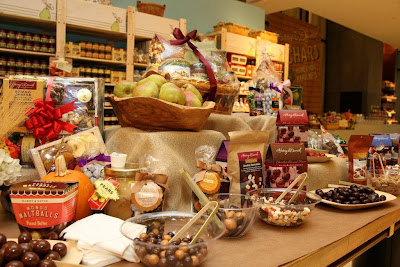For the New York Times' Jeff Gordinier, the announcement struck a rather familiar chord.
Surely it tells us something about the fickle nature of the American appetite that Harry & David is looking for ways to remind its customers of the existence of trees.
Harry & David’s fruit baskets have been a staple of American life for decades, but the firm has been going through a rough patch lately. Sales cratered during the recession, and a debt crisis forced the company to file for Chapter 11 bankruptcy protection last week...
Debt may be a serious threat on the financial front, but Harry & David... illustrates a different sort of peril for anyone who makes or sells a food product that has long been viewed as an established emblem of luxury. When there is a profusion of new choices, the allure of earlier choices can begin to dim. Sometimes it’s hard to stay smitten with a care package shipped from the Pacific Northwest in the belly of a jet when you can pick your own heirloom fruit right off the branches at a nearby orchard that supposedly provided sustenance to soldiers during the Revolutionary War.
Think of this as Brie Syndrome. Back in the 1970s and 1980s, it was de rigueur, when guests came over, to haul out a cold wheel of Brie.
“It was the first imported cheese that we knew and we could pronounce,” said Jason Tesauro, an author of the book “The Modern Gentleman: A Guide to Essential Manners, Savvy & Vice,” who curates high-end parties and tasting events from his headquarters in Richmond, Va.
Over time, though, Americans began to learn about manchego and Humboldt Fog and mimolette and Époisses. “Everybody just started getting more and more sophisticated about cheese,” said Susan Holland, a New York event producer. “There’s fabulous Brie, but Brie got pushed aside in the rush to learn new things, and it became not chic. It became the opposite of chic.”
These days, as the American gourmand becomes increasingly obsessed with the origins and purity of every organic nibble that might appear on, say, a cheese and fruit platter, it takes extra effort to fend off the vogue for shaggy, independent upstarts...
“What you see with Harry & David is that they really didn’t adapt,” said Pamela N. Danziger, a consultant and author who has focused, in books like “Let Them Eat Cake,” on the fine points of luxury marketing. “We are really evolving toward more of a connoisseur culture. Why would you buy a Harry & David pear when you can go to Whole Foods and get the same quality pear?”
Brie Syndrome afflicts a wide range of foods and drinks that have had a challenging time holding onto their Fancy Champion of the World status. Chowhounds who are old enough to remember the days when Whitney Houston and Phil Collins dominated the pop charts can attest that, yes, there was a time when a plate of cold pasta salad with sun-dried tomatoes, accompanied by a glass of Perrier and followed by a handful of Famous Amos cookies, was considered a lunch fit for a duchess.This dynamic is hardly unique to the food industry--rather, it seems to be a universal tenet of capitalism. There comes a time in just about any corporation's life cycle when it (or its product) has exhausted its usefulness, if only because the company's success has bred imitators and eventually led to the product's expansion to the masses (think plasma televisions). Unless a company is particularly innovative, or else especially skilled at planned obsolescence (as Apple and Microsoft have been), it's likely that it will eventually find itself on the downside of the corporate life cycle.
Ironically enough, the better a corporation's product is (and the more widespread its popularity becomes), the more likely it becomes that the company will eventually find itself irrelevant, swamped by a sea of competitors and imitators. But it's exceedingly difficult for us to let these institutions die, whether because so many employees' well-being depends on their existence (hello, General Motors) or simply because we have an emotional connection to the brand.
Nevertheless, creative destruction is a necessary part of a properly functioning democracy. I've pointed this dynamic out several times here before, with Blockbuster, Borders, the music industry, and the Sony Walkman being among the most prominent examples. Brie Syndrome, then, is really just creative destruction applied to the food industry. We're all better off as consumers now with the wealth of food options at our disposal, but it certainly doesn't seem that way to purveyors of Brie, or to the executives at Harry & David. Maybe the company will turn things around and surprise us all, but maybe it's just another victim of creative destruction doing its thing.
[New York Times]

No comments:
Post a Comment